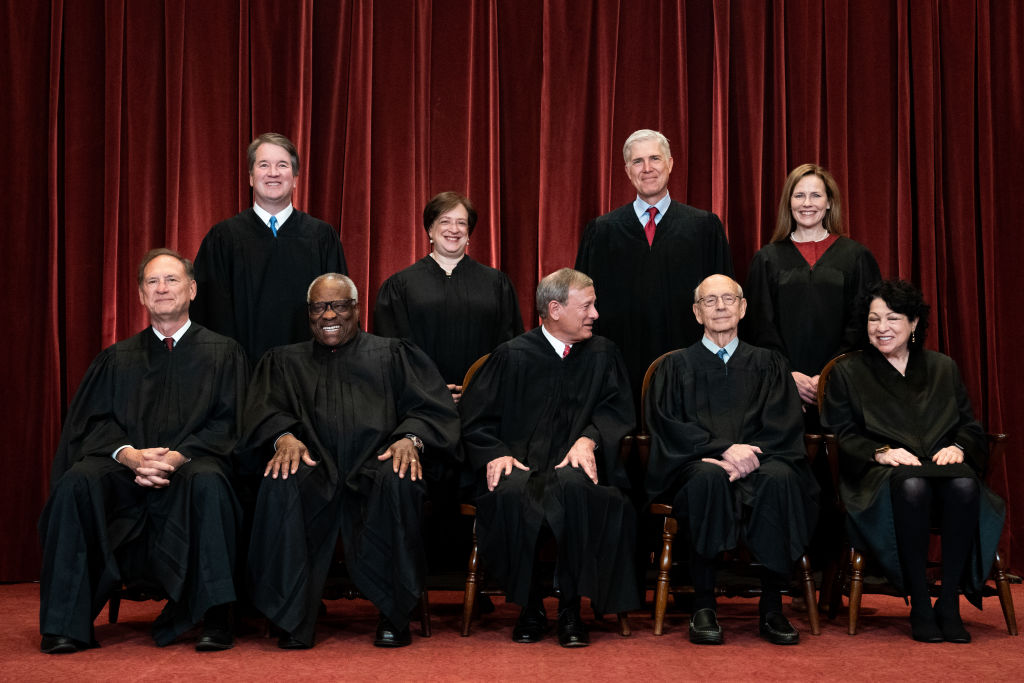Supreme Court's approval rating is sinking fast, even as justices insist they aren't partisans


A free daily email with the biggest news stories of the day – and the best features from TheWeek.com
You are now subscribed
Your newsletter sign-up was successful
A recent Gallup poll showed President Biden's approval rating falling 6 percentage points in one month, to 43 percent. But the Supreme Court fared worse, sliding to a record-low 40 percent from 49 percent in July and 58 percent a year earlier. Disapproval of the high court hit a new high of 53 percent. In a Marquette University Law School poll, public approval of the Supreme Court dropped to 49 percent in September from 60 percent in July.
The Supreme Court's plummeting approval follows a handful of controversial "shadow docket" emergency rulings — without hearings or significant internal argument — overturning two Biden administration initiatives and, notably, allowing Texas' effective abortion ban to take effect over strident dissent from four of the nine justices. And it comes "as the court embarks Oct. 4 on one of the most potentially divisive terms in years," The Washington Post reports, with gun control, church-state separation, and the federal right to an abortion on the docket.
"Not since Bush v. Gore has the public perception of the court's legitimacy seemed so seriously threatened," Irv Gornstein, executive director of the Georgetown Supreme Court Institute, said last week. Three of the nine justices — GOP appointees Amy Coney Barrett and Clarence Thomas and Democratic appointee Stephen Breyer — have publicly insisted this month that the justices aren't "partisan hacks," as Barrett said at Senate Majority Leader Mitch McConnell's University of Kentucky institute.
The Week
Escape your echo chamber. Get the facts behind the news, plus analysis from multiple perspectives.

Sign up for The Week's Free Newsletters
From our morning news briefing to a weekly Good News Newsletter, get the best of The Week delivered directly to your inbox.
From our morning news briefing to a weekly Good News Newsletter, get the best of The Week delivered directly to your inbox.
Barrett and Thomas, who will appear alongside McConnell next month at an event at the conservative Heritage Foundation, insist their decisions are based on "judicial philosophy" and not partisan leanings, and Breyer is promoting his book on the perils of seeing the Supreme Court as political. Some conservatives blame Congress or the media for making the Supreme Court appear increasingly partisan, while liberals point to the court's actual rightward shift after McConnell's hardball court-tilting machinations. Sen. Lisa Murkowski (R-Alaska) suggests "maybe it's just that everything now has become more political."
Regardless, the public is taking note. "It is all well and good for justices to tell the public that their decisions reflect their judicial philosophies, not their political affiliations," Georgetown's Gornstein said. "If the right side's judicial philosophies always produce results favored by Republicans and the left side's judicial philosophies always produce results favored by Democrats, there is little chance of persuading the public there is a difference between the two."
A free daily email with the biggest news stories of the day – and the best features from TheWeek.com
Peter has worked as a news and culture writer and editor at The Week since the site's launch in 2008. He covers politics, world affairs, religion and cultural currents. His journalism career began as a copy editor at a financial newswire and has included editorial positions at The New York Times Magazine, Facts on File, and Oregon State University.
-
 How the FCC’s ‘equal time’ rule works
How the FCC’s ‘equal time’ rule worksIn the Spotlight The law is at the heart of the Colbert-CBS conflict
-
 What is the endgame in the DHS shutdown?
What is the endgame in the DHS shutdown?Today’s Big Question Democrats want to rein in ICE’s immigration crackdown
-
 ‘Poor time management isn’t just an inconvenience’
‘Poor time management isn’t just an inconvenience’Instant Opinion Opinion, comment and editorials of the day
-
 Rubio boosts Orbán ahead of Hungary election
Rubio boosts Orbán ahead of Hungary electionSpeed Read Far-right nationalist Prime Minister Viktor Orbán is facing a tough re-election fight after many years in power
-
 Key Bangladesh election returns old guard to power
Key Bangladesh election returns old guard to powerSpeed Read The Bangladesh Nationalist Party claimed a decisive victory
-
 Epstein files topple law CEO, roil UK government
Epstein files topple law CEO, roil UK governmentSpeed Read Peter Mandelson, Britain’s former ambassador to the US, is caught up in the scandal
-
 Iran and US prepare to meet after skirmishes
Iran and US prepare to meet after skirmishesSpeed Read The incident comes amid heightened tensions in the Middle East
-
 EU and India clinch trade pact amid US tariff war
EU and India clinch trade pact amid US tariff warSpeed Read The agreement will slash tariffs on most goods over the next decade
-
 Israel retrieves final hostage’s body from Gaza
Israel retrieves final hostage’s body from GazaSpeed Read The 24-year-old police officer was killed during the initial Hamas attack
-
 China’s Xi targets top general in growing purge
China’s Xi targets top general in growing purgeSpeed Read Zhang Youxia is being investigated over ‘grave violations’ of the law
-
 Panama and Canada are negotiating over a crucial copper mine
Panama and Canada are negotiating over a crucial copper mineIn the Spotlight Panama is set to make a final decision on the mine this summer
